The United States will be forced to leave the Middle East and Iran’s “last blow” is yet to come, chief commander of the Revolutionary Guard (IRGC) said Thursday.
Speaking at a ceremony in memory of IRGC ‘martyrs’, Hossein Salami mentioned the targeted killing of Qassem Soleimani in Baghdad in 2020 in a US drone strike and said Iran already landed its first blow, by firing missiles at bases in Iraq hosting US troops, days after the killing.
“They received the first slap, and the second will be their gradual withdrawal from the region, but the last slap is yet to come,” he said.
Soleimani was the commander of IRGC’s extraterritorial Quds Force, who was the mastermind of the Iranian regime’s strategy of building a proxy network in the Middle East, made up of armed militias, Shiite groups, and the Syrian government.
Soleimani invested heavily in post-Saddam Iraqi chaos, arming Iran’s proxies and instructing them to launch attacks against US forces in the country. As these attacks intensified in late 2019, former US President Donald Trump ordered his killing, which was a heavy blow to the regime.
Salami went on to highlight attacks against Israel. “These days fire is raining down on Israelis from Gaza, but the Zionists are unable to do anything and are powerless, and America has also left the region.”
Salami’s statement comes as the US and Israel are in close cooperation in intelligence and military matters, conducting large joint military drills.
The US and Israel conducted their largest-ever joint military exercises in January, with thousands of troops, dozens of aircraft, and naval vessels in and around Israel.
The drills, dubbed Juniper Oak 2023 was widely seen as a message to Iran, although US officials said the live-fire exercise did not include mock-ups of Iranian targets, but American strategic bombers did take part.
Salami also warned that “no one can prevent our maritime trade, and if this happens, we will settle accounts anywhere in the world.”
It is not clear what Salami was referring to, but the US Navy and its European allies have interdicted several shipments of weapons and explosive from Iranian ports headed to Yemen in recent months. Iran also breaks US oil export sanctions by shipping cargos on “ghost tankers” that usually transfer the crude to other tankers on high seas to conceal their origin.
IRGC leaders have intensified their rhetoric since March and openly indicted that they are supporting the Palestinian Hamas and Islamic Jihad in rocket attacks against Israel.
The pressure of economic sanctions has crippled Iran’s economy, but the regime continues to expand its nuclear program, with high levels of uranium enrichment. Already, the UN nuclear watchdog and governments say that Tehran has accumulated enough enriched uranium to build two or more bombs.
Israel has repeatedly warned that it will not tolerate a nuclear-armed Iran in the region.
The Biden administration, despite holding indirect nuclear talks with Tehran, says that all options are on the table, indicating the US might assist Israel in a possible attack to prevent Iran from becoming a nuclear power.
However, Republicans in the US Congress criticize the Biden team for not having a new policy regarding Iran after nuclear talks reached an impasse last September.
